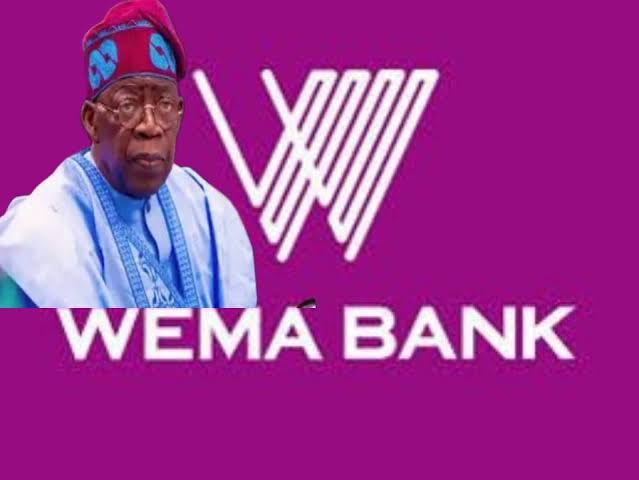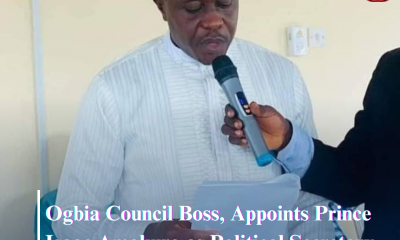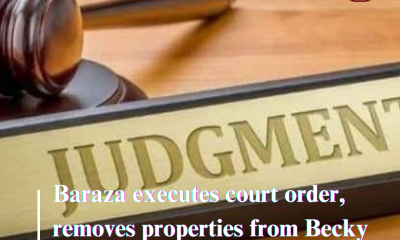Business
The Federal Bride… Intrigues As Wema Bank Becomes President Tinubu’s Favourite

– Bank Corners All Govt Accounts, Lucrative Contracts
– Rival Banks Green With Envy As Powers That Be Caress Wema’s Behind.
The union of Wema Bank and President Bola Tinubu’s administration transcends politics, it would seem. Think of it like a marriage between a frantic groom and a giddy bride: every liaison points to the climatic final scene – when the bank harnesses unquantifiable returns from its dalliances with Mr President.
Since President Tinubu took over the reins of government, the Bank has enjoyed a new lease of life. Some have attributed it to the chummy camaraderie and undying love between the bank and Mr President.
No sooner did Tinubu assume office than all the federal allocation accounts got moved to Wema Bank.
READ ALSO: UPDATE: Beneficiaries protest as banks begin COVID-19 loan recovery
Also in furtherance to its pledge to support the job creation agenda of the Tinubu administration, WEMA Bank in partnership with the Office of the Vice President, has concluded arrangements to commence an initiative that will impact two million youths and one million Micro and Small and Medium Enterprises (MSMEs) across the country.
The Vice President, Sen. Kashim Shettima, who received an update report on the programme during a courtesy visit by the Managing Director of Wema Bank, Moruf Oseni, lauded the commitment and partnership of the bank for the initiative.
The delegation was at the Villa to brief the Vice President on the progress made in the implementation of the FGN-ALAT Digital Skill-Novation Programme – an initiative of a partnership between the Federal Government and WEMA Bank to train two million youths and empower one million Micro Small and Medium Enterprises (MSMEs) across Nigeria.
One of the great ironies in modern Nigeria, President Tinubu’s Nigeria to be precise, is that the less money you have, the more you pay to use it. The country’s “unbanked” must pay high fees to fringe banks to turn their paychecks into cash, pay their monthly bills, or send money to a spouse or a child.
The unbanked pay much of their income—up to 10 per cent—just to use their money. For these families, the total price of simple financial services each month is more than they spend on food. Indeed, it is very expensive to be poor.
This problem, however, reaches well beyond those traditionally considered poor. More than 70 per cent of Nigerians consider themselves “middle class,” yet anywhere from 20 to 40 per cent of the population must rely on check cashing or payday lending services.
And the tragedy of money being siphoned from the paychecks of ordinary Nigerians is the least egregious part of a much larger problem. Sometimes, those who live paycheck to paycheck face an emergency. Over half the people in the country are so cash-strapped that they would not be able to access N10,000 without selling something or borrowing money.
The need to borrow to deal with emergencies—often at very high-interest rates—adds another layer of financial strain on those least able to bear it.
READ ALSO: Your Funds Are Safe In Banks, CBN Assures Depositors
For example, Bolanle Akande, a father of six children and a grandfather of four, lost his job in the wake of the naira scarcity contrived by the deposed Governor of the Central Bank of Nigeria (CBN) during the intrigues leading to the 2023 presidential elections. To survive, he emptied his bank accounts, at exorbitant charges, sold his car, and pawned some of his possessions to make ends meet during the crisis.
When he still needed an extra N50,000 to cover her monthly expenses, he went to a loan shark masquerading as a payday lender, who lent him the money at 270 per cent interest. He would eventually take out three more loans from two other loan sharks and a cooperative to buy the time he needed to pay off the original N50,000. In the end, he had paid double his initial loan in interest over seven months to borrow just N50,000.
Stories like Akande’s are quite common. Most payday loans are followed by at least another loan but often another 10 payday loans. This cycle of debt is an obvious problem, but the very existence of the fringe banking sector is a symptom of something deeper.
It’s the symptom of a greater evil: the lack of humane loan facilities and federal support for the country’s fast-fading middle class and the impoverished, unbanked population.
The latter constitute the human segments worthy of urgent government intervention. They suffer extreme impoverishment due to the very discriminatory banking and financial system; nonetheless a juicy partnership blooms between the federal government and banks like Wema.
Consequently, pundits have begun to wonder why no similar gesture has been accorded Nigeria’s underserved and unbanked segments.
Even though the federal government would claim that it patronises the bank to empower the citizens, it is noteworthy that the benefits to the citizenry are quite minimal compared to the huge fortune accruing to the bank via such transactions.
Amid such systemic malady, a financial player like WEMA Bank makes a great fortune from its patronage by entities including the federal government of Nigeria and influential individuals like Chief Kessington Adebutu, founder of the Baba Ijebu lotto.
Wema Bank Plc, commonly known as Wema Bank, is a Nigerian commercial bank, licensed by the Central Bank of Nigeria (CBN), the regulator of the nation’s banking sector. As of 2019, Wema Bank operates the largest digital banking system in Nigeria, ALAT By Wema, which is fully in use in all of the nation’s thirty-seven states and territories.
The bank was established on May 2, 1945, as a private limited liability company (under the old name of Agbonmagbe Bank Limited). The bank was founded on May 2, 1945, as Agbonmagbe Bank by the Late Chief Mathew Adekoya Okupe. He set up the first branches of the bank which were in Ebute-metta, Sagamu, Abeokuta and Ijebu-Igbo. The bank remained with him until it was taken over by the Western Nigeria Marketing Board and later renamed Wema Bank Limited in 1969. Since then, Wema Bank has gone on to be Nigeria’s longest-surviving indigenous bank. It was granted a commercial banking license and commenced banking activities during the same year. Wema Bank converted to a public limited liability company in 1987.
In 1990, the Bank was listed on the Nigerian Stock Exchange. It trades under the symbol: WEMABANK.
It was granted a Universal Banking License in February 2001. In December 2015, Wema became a national bank, with a capital base of over N43.8 billion having met the regulatory requirements for the National Banking license as stipulated by the Central Bank of Nigeria. Wema Bank Plc is a publicly traded limited liability company, trading under the symbol WEMABANK on the Nigerian Stock Exchange.
-

 News2 days ago
News2 days agoFamily, Friends Celebrate Jailed Former Deputy Senate President, Ike Ekweremadu’s Birthday
-

 Niger Delta5 days ago
Niger Delta5 days agoNiger Delta Stakeholders Accuse Olu of Warri and PINL Management of Dishonesty Over Terminated Pipeline Contract
-

 Politics6 days ago
Politics6 days agoRivers’ crisis: Timi Frank to TInubu, APC: Wike’s illegal impeachment plot against Fubara distabilze your administration
-

 Politics6 days ago
Politics6 days agoOgbia Council Boss, Appoints Prince Isaac Amakuro as Political Secretary
-

 Business3 days ago
Business3 days agoBaraza: Bribena pleads for understanding, highlights solutions to organization’s problems
-

 News6 days ago
News6 days agoBaraza executes court order, removes properties from Becky father’s residence
-

 Politics2 days ago
Politics2 days agoPROPHESY TO PRESIDENT BOLA AHMED TINUBU ABOUT 2027
-

 Business5 days ago
Business5 days agoWema Bank Unveils CoopHub, Nigeria’s First Digital Platform for Cooperative Societies




